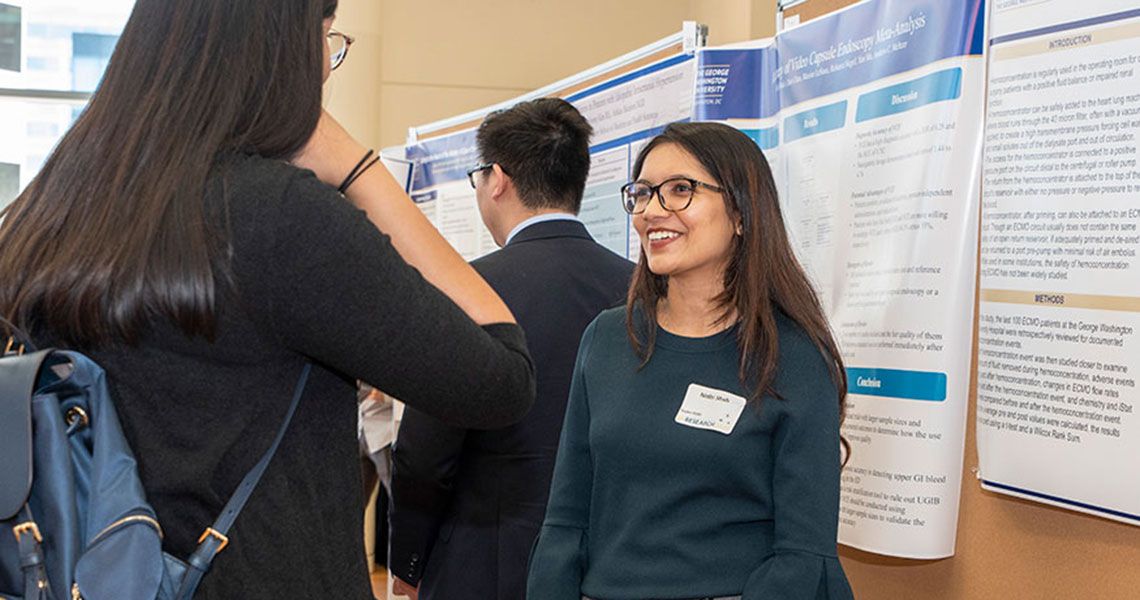Knowing that the research you are working on in the lab may one day directly help patients is really gratifying, said Monica Kraft, MD, to the Lisner Auditorium audience gathered to celebrate Research Days at the George Washington University (GW).
Medical and health sciences students, along with postdoctoral fellows, students in the Institute for Biomedical Sciences (IBS), and those from the GW School of Nursing and the Milken Institute School of Public Health at GW (Milken Institute SPH), participated in day two of the 24th Annual GW Research Days, which focused on research in medicine and health, on April 10.
In his welcoming remarks, Jeffrey S. Akman, MD ’81, RESD ’85, vice president for health affairs, Walter A. Bloedorn Professor of Administrative Medicine, and dean of the GW School of Medicine and Health Sciences, echoed Kraft’s sentiments, “Every day there is the opportunity to generate knowledge and today we get to celebrate that.”
Kraft, who serves as the Robert and Irene Flinn Professor of Medicine and chair of the Department of Medicine at the University of Arizona College of Medicine in Tucson, focused her keynote address on the research that she and her team are doing on innate immunity in asthma.
“We are at a very interesting time in regard to treatment of asthma, because we understand immunology,” she explained. “It’s because of research that we are able to translate this to patient care.”
The SMHS keynote event also served as a forum to recognize the medical student winners of the William H. Beaumont Research Award, who had the opportunity to present their research to their peers. Among this year’s winners was second-year MD student Maria Abigail Cerezo, who placed first and presented her research, “Evaluation of Longitudinal Antibody Responses in Zika-Infected Individuals from Colombia.”
“Winning this award reminded me that I can still pursue my interests aside from medicine,” she said. “In college I worked on projects using bacteriophages, a type of virus, and worked on mutating DNA to study viral propagation and adaptation. I love basic science. There's just something about the unknown and the hope of discovering something new that I find truly exciting.”
Sharjeel Chaudhry, a third-year MD student, received the second-place award and presented on “Prevention of Cardiovascular Thrombosis through Inhibition of Coagulation Factor XII.”
“Participating in Research Days is critical for medical students because it allows us to engage in personal and professional self-assessment,” he said. “Getting feedback from seasoned researchers in the field, and quite frankly, taking that leap of faith to get out there, try our best, and learn from each experience is important for our training as physician-scientists.”
The third place award went to second-year MD student Neil Almeida, who presented his research, “CyTOF Analysis Provides Insight into Immune Response to H3.327M Neoantigen Peptide Vaccine in Glioma Patients.”
“As medical students we are continuously learning and exploring areas of interest,” he said. “Research is one avenue to study a topic of interest very closely.”
The Milken Institute SPH welcomed Anselm Hennis, MD, MSc, PhD, director of the Department of Noncommunicable Diseases and Mental Health at the Pan American Health Organization/World Health Organization, to deliver the keynote address to public health students.
Hennis spoke on his history of research and used his experience, such as traveling to Uganda to study AIDS, to encourage the students to take chances and not let failure keep them from pursuing their research. “No one said that pursuit of knowledge is without risk,” he said. “If you at first you don’t succeed, then try again.”
Throughout the afternoon on day two, students presented posters are more than 300 different topics. Several received awards at the end of the day, including IBS PhD students, Allison Powell who received first-place for her study, “Antibody-Secreting T Cells Engineered for Tripartite Immune Response Against HIV,” Jacqueline Howard who placed second with her study, titled “Analysis of DNA Break Repair Inhibition in Trypanosoma Brucei,” and Debbie Ledezma who received the third-place award for her research, “Combined Nanoparticle-Based Photothermal Therapy and Epigenetic Immunomodulation for Melanoma.”



